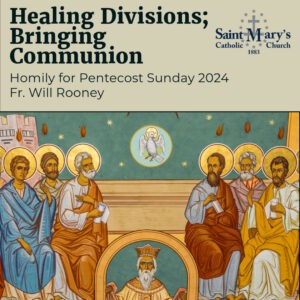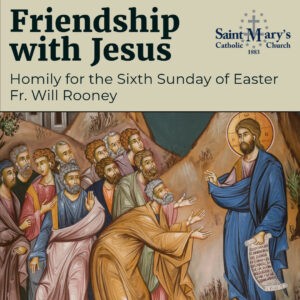We may easily be confused when we arrive at Mass for the 1st Sunday of Advent and hear the following prayer for the Collect:
Grant your faithful, we pray, almighty God,
the resolve to run forth to meet your Christ
with righteous deeds at his coming,
so that, gathered at his right hand,
they may be worthy to possess the heavenly Kingdom.
Through our Lord Jesus Christ, your Son,
who lives and reigns with you in the unity of the Holy Spirit,
one God, for ever and ever.
Let us take a moment to reflect upon this prayer and to understand its content. First, we ask for what are we praying? We pray for the grace to resolve our will “to run forth to meet” Christ, accompanied by righteous deeds when He comes. The coming that is referred to in the prayer is not the coming at Bethlehem but rather the coming at the end of time. It is here that we can become puzzled, if we forget the dual meaning of the season that we begin on this first Sunday. We may ask the question, “are we not supposed to be preparing for the memorial of the coming of Christ in the past – Christmas?” It may seem shockingly out of place, in the time of preparation for Christ’s birth, that the Gospel of the day features a fully grown Christ, commanding us, “Be vigilant at all times and pray that you have the strength to escape the tribulations that are imminent and to stand before the Son of Man.”[1] But we have to remember that Advent – a word signifying in the Roman culture, the coming of a king to a place – has both happened and is still yet to come.
In other words, yes, we are preparing for the memorial of the past events of salvation history. But additionally, and preeminently in these first two weeks of Advent, we prepare for the coming of Christ at the end of time. The season of Advent serves a dual purpose in the liturgical year. It reminds us of the past events of the salvation history and points towards the Parousia, the coming of Christ at the end of time. The Church in one of her documents concerning the liturgical year speaks about this season in the following manner:
“Advent has a twofold character: as a season to prepare for Christmas when Christ’s first coming to us is remembered; as a season when that remembrance directs the mind and heart to await Christ’s Second Coming at the end of time. Advent is thus a period for devout and joyful expectation.”[2]
The beautiful thing is that in remembering the past saving events we are moved towards a consideration of the future. We must let Advent cultivate in our hearts a sincere and sure hope rooted in the memory of past events. Commenting on this, Cardinal Ratzinger wrote in a little book of meditations throughout the liturgical year: “Advent is concerned with that very connection between memory and hope which is necessary to man. Advent’s intention is to awaken the most profound and basic emotional memory within us, namely, the memory of the God who became a child. This is a healing memory; it brings hope.”[3] Advent is then a time of “joyful expectation of the feast of the Nativity but with a view to directing the thoughts of Christians above all to the glorious return of the Lord at the end of time.”[4] The coming of the Lord at the end of time will be one of glory and one of judgement and we ought to be hopefully expectant of this coming. In accordance with this hopeful expectation, we ought to work to prepare ourselves, cooperating with the Holy Spirit to “be transformed by the renewal of your mind, that you may discern what is the will of God, what is good and pleasing and perfect.”[5]
This is why it is appropriate that our prayer at the beginning of Advent begs the Lord to make our wills resolved towards pursuing Him and going out to meet Him at His coming in glory. We ask that we might be counted among the righteous, by His Grace, we can be amongst those who are “gathered at Christ’s right hand in the kingdom,” whom, “the king invites …to come and take possession of the kingdom prepared for them.”[6]
[1] Luke 21:36
[2] Congregation for Divine Worship, General Norms for the Liturgical Year and the CalendarVatican City, 1969). 39
[3] Joseph Cardinal Ratzinger, Seek that which is Above : Meditations through the Year (San Francisco: Ignatius Press, 1986). 12
[4] Irénée Henri Dalmais, Pierre Jounel and Aimé Georges Martimort, The Liturgy and Time, trans. Matthew J. O’Connell, Vol. IV (Collegeville, MN: Liturgical Press, 1986). 93
[5] Romans 12:2
[6] Patrick Regan, Advent to Pentecost : Comparing the Seasons in the Ordinary and Extraordinary Forms of the Roman Rite (Collegeville, Minn.: Liturgical Press, 2012). 31





